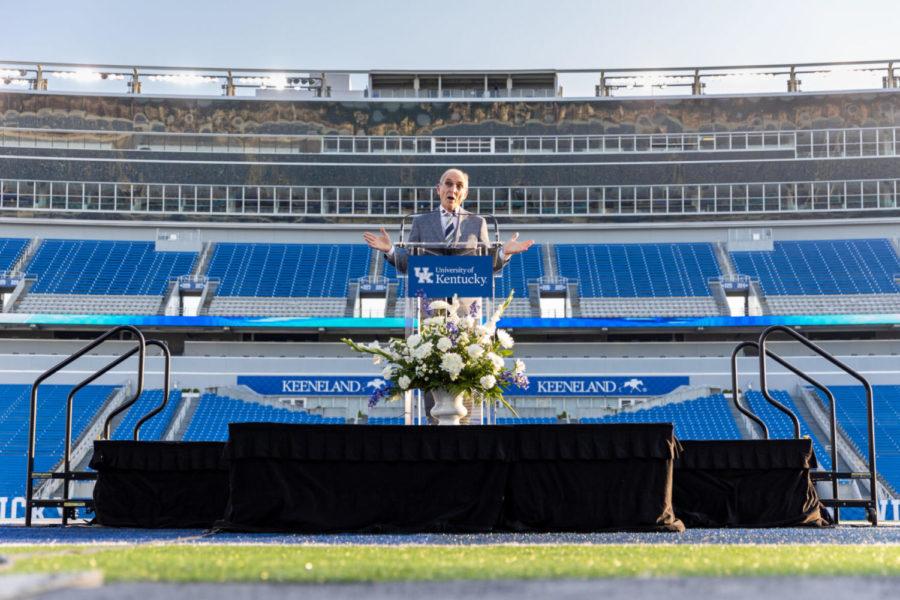COVID Update: One goal achieved but more progress to come, Capilouto says
UK president Eli Capilouto speaks to new students during the Wildcat Welcome Ceremony on Friday, Aug. 20, 2021, at Kroger Field in Lexington, Kentucky. Photo by Jack Weaver | Staff
September 16, 2021
Over 80 percent of the campus community is fully or partially vaccinated as of Sept. 9, UK President Eli Capilouto announced to UK’s Board of Trustees Friday.
With an 81.5 percent vaccination rate, the university has surpassed its initial goal of 80 percent, set before the start of the fall semester. However, Capilouto said there is more progress to be made.
“That 80 percent was never the finish line but a starting point,” he said.
This week, Capilouto is set to announce compliance measures for those who are unvaccinated but are not completing their required weekly COVID testing. He said he will also introduce employee and student organization vaccination incentives.
“We are going to keep pushing and pushing until those rates are certainly going to exceed 85 percent, and I hope more than 90 percent,” he told the university’s staff senate Thursday.
As of Sept. 8, 80.7 percent of students, 88.8 percent of faculty and 81.3 percent of staff are at least partially vaccinated, according to UK’s COVID dashboard. Additionally, UK has conducted 8,558 tests since the semester began, with a 3 percent positivity rate.
At UK, there are 102 total active COVID cases as of Sept. 8, with a seven-day rolling average of 126 cases. In the broader Lexington-Fayette area throughout the past week, the seven-day rolling average is 255 new cases each day, a figure approaching the levels of the third wave peak around November 2020, according to Lexington-Fayette County Health Department data.
The state as a whole isn’t faring any better, according to Gov. Andy Beshear’s Monday update. Kentucky’s positivity rate is at 13.7 percent, with over 2,400 COVID patients hospitalized in the state’s hospitals, 70 percent of which currently have critical staffing shortages. Over a quarter of Monday’s new COVID cases involved children under 18.
This rising community spread has many UK faculty and staff members concerned for their safety as the campus returns to in-person learning. As of Sept. 14, an open letter calling for Capilouto and Acting Provost Robert S. DiPaola to implement a vaccine mandate has received over 2,300 signatures from faculty, staff and students. According to the letter, it was sent to administrators on Sept. 9.
Others have asked UK administration to allow them to switch modalities, from in-person to hybrid or online, without having to wade through administrative red tape. Monday night, the University Senate passed a resolution once again requesting a mandate.
Capilouto said he “found the discussion and dialogue to be thoughtful, respectful and substantive” and that the community “will be better for it,” but reiterated that right now, a vaccine mandate is not part of the administration’s current strategy to increase the campus-wide vaccination rate. Capilouto cited three reasons for this approach.
First, he explained that UK is already making rapid progress without a mandate, through a combination of education, communication, incentives and compliance measures.
UK spokesperson Jay Blanton told the Kernel that Capilouto and senior administrators have held conversations with faculty, staff and student leaders throughout the past weeks to continuously adapt the university’s policies to the pandemic.
“The proof of what we are doing is in the numbers,” Blanton said. “The plan is working.
Second, Capilouto said a vaccine mandate would be controversial.
“Vaccines are a deeply polarizing measure — at least vaccine mandates — in what is already a deeply polarized world,” Capilouto said. “National polls show it, and a number of state actions prohibiting mandates underscore it.”
During a student government meeting, SGA president Michael Hawse echoed this, saying that the likelihood of the university enforcing a vaccine mandate is low, possibly because of the potential political response in Frankfort.
“I don’t think it’s going to happen in the near future because we’re in a special session for the (Kentucky) legislature, and I think the last thing they want to do is make news to the legislature while they’re in session,” Hawse said. “There is a large Republican population in the Senate — it’s a supermajority — and states where that has been similar have been making mask mandates … [and] vaccine mandates illegal.”
The third reason UK gave for not pursuing a vaccine mandate at this time is the subsequent requirement to accept religious, medical and other exceptions. Capilouto spoke about the flu vaccine mandate implemented at UK last year, which only succeeded in vaccinating 65 percent of the student population, as support for the idea that even a mandate would not be a guarantee.
In contrast, the university does not have the same requirement to honor exceptions regarding testing requirements.
“Although a mandate has many benefits, as I continue to take in all of the available information, I believe we have the right approach at this time to continue increasing campus vaccination levels,” Capilouto said. “If new information of circumstances become available, we will pivot.”
In an interview with the Kernel in late August, Capilouto said he was worried about the spread of the virus, and that UK would have to rely on the campus community taking on the responsibility of doing what is best for them and those who are close to them.
“This is not going to be a case of zero risk. What we’re going to have to do is reduce it. And by taking the vaccine, you rightly reduce the harm if one were to be infected. There’s nothing more powerful than that vaccine,” Capilouto said.




















































































































































